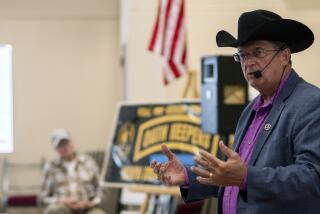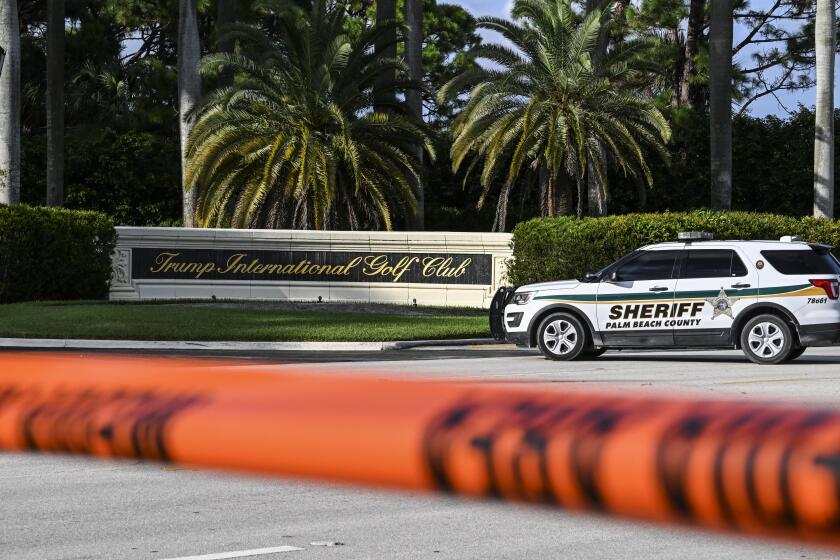Algeria Unbound
As the resistance in Iraq intensified, some U.S. military commanders and jumpy citizens went to screenings of the 1965 Gillo Pontecorvo classic on urban guerrilla warfare, “The Battle of Algiers.” After using torture and murder against the rebels, the French won the battle but lost the war. Algeria became independent and for many years was a standard-bearer of the anti-Western, anti-capitalist Third World movement.
How things have changed. Algeria just completed the freest election in the history of the Arab world, it has lots of oil and gas, it wants to work closely with the United States against fanatical terror -- and, as a special added bonus, it still doesn’t like France.
For the record:
12:00 a.m. May 2, 2004 For The Record
Los Angeles Times Sunday May 02, 2004 Home Edition Opinion Part M Page 3 Editorial Pages Desk 1 inches; 39 words Type of Material: Correction
Algeria -- An April 25 Opinion article, “Algeria Unbound,” referred to Algeria as a Middle Eastern nation. Most authorities, including the Los Angeles Times stylebook, do not consider the North African nation to be part of the Middle East.
Algerian President Abdelaziz Bouteflika has played a leading role in the reforms that are changing the country. First elected in a 1999 contest widely regarded as rigged, Bouteflika has lifted controls on the press and on the opposition. He was reelected earlier this month. A brash and independent press criticizes the president daily -- and as long as it remains free, Algeria’s institutions will continue to gain international respect.
This is today’s Algeria, the 10th-largest country in land area and one of a handful of places in the Middle East where U.S. foreign policy may actually be working. Because of that, the U.S. faces key challenges in the months and years ahead.
After years of frosty relations -- and years in which terrorism kept U.S. citizens off its streets and our diplomats huddled in compounds -- Algeria is opening up to the world, and especially to the United States.
Visiting Americans enjoy a kind of celebrity status. While staying at the Al Djezeira Hotel (formerly the St. Georges), where Dwight Eisenhower planned the invasion of Italy, I spoke at universities, think tanks and at an all-girls high school. It was an unusual experience for a lecturer in foreign affairs. At one college I visited, we had to move from a small room to a huge lecture hall because students, hearing that there was an American on campus, kept streaming in. Though there were plenty of sharp and pointed questions about U.S. foreign policy on the usual issues -- the Palestinians and Iraq at the top of the list -- many students seemed more interested in efforts by the U.S. Embassy to give more Algerian students opportunities to study in the United States and to learn English.
More than one Algerian asked about building ties to California. St. Monica was born in what is now Algeria, many Algerians noted, and they asked whether the city of Santa Monica was looking for sister cities in the Middle East. Are U.S. colleges looking for partnerships and exchanges? If so, Algerian cities and universities are standing by to take their calls. The welcome mat is also out for U.S. business and investors.
Algeria has fought harder against fanatical terrorism than just about any other country. More than 150,000 died in a shadowy, sometimes dirty underground war against terrorists after the Algerian military refused to let an Islamic party take power following elections in 1991. Many questions remain about those years, but most Algerians want to move on. More than that, in and out of government, the Algerians with whom I spoke understand the need for the United States and other countries to fight terrorism with everything they have.
Algeria’s opening to the world has security and economic dimensions.
The Algerian military, the moving force in national politics for most of the country’s recent history, is eager to increase links with the United States and the North Atlantic Treaty Organization.
Algeria plans to attend the NATO convention this June in Istanbul, and Algerian movement toward a partnership with the security alliance looks likely. Eventual membership cannot be ruled out.
Economically, the country is also looking to rejoin the world. Algeria’s economy not only bears scars from the war on terror but it also suffers from the consequences of years of socialist-style planned development. Change will be difficult without setting off new waves of insecurity and alienation. Though the country has reserves of $33 billion, thanks to its oil and gas, Algeria will have to make extremely painful reforms to develop a modern economy. Making this transition work needs to be an important part of U.S. diplomacy.
Unfortunately, Washington’s economic-reform tool kit has had less success in developing countries than Americans often like to think.
The Asian financial crisis of 1997-98, the Latin American meltdowns in Argentina and Brazil, and the rise of anti-free-market, anti-globalization and even anti-democracy sentiment in parts of Latin America should warn us that the opportunity in Algeria is both precious and fragile.
Neighboring Morocco has a free-trade agreement with the United States; so does Jordan. Getting Algeria into the World Trade Organization on generous, flexible terms, then moving toward both a free-trade agreement with the U.S. and regional cooperation between Algeria and neighbors like Morocco can help the Algerian government provide jobs for unemployed and underemployed youths.
South Africa, where a national liberation movement was inspired by Algeria’s revolution against France, and whose military wing studied “The Battle of Algiers,” is the best example of how a formerly left-wing liberation movement can lead its people into the modern economy. Rather than lecturing Algerians and developing a new “Washington consensus” for their country, we might do well to encourage them to deepen their links, bilaterally and in the African Union, with South Africa as part of trying to develop a “Johannesburg consensus” for development, education and market-opening measures in important developing countries.
Additionally, the United States should support Algeria’s efforts to sign an access agreement with the European Union that would increase trade across the Mediterranean. Algeria desires a close political relationship with the United States, and it is in our interest to promote this; however, economically, Algeria cannot prosper without healthy links with its Mediterranean neighbors.
Ultimately, if Algeria wants to move in Turkey’s direction -- toward membership in NATO and the European Union -- the United States should encourage and support it. Nothing could advance the cause of peace in the Middle East more than the sight of more Muslim democracies joining important Western organizations.
As relations with Libya and Algeria improve, and with continuing close ties with Morocco, the United States has, despite the war in Iraq and tension between Israel and the Palestinians, been steadily working to create the kinds of partnerships and to press for the kinds of reforms that are so badly needed. In North Africa, and also across much of the Sahara, the United States is making real progress in building an effective coalition against terror.
This is good news at a time when we could use some.
More to Read
Sign up for Essential California
The most important California stories and recommendations in your inbox every morning.
You may occasionally receive promotional content from the Los Angeles Times.










